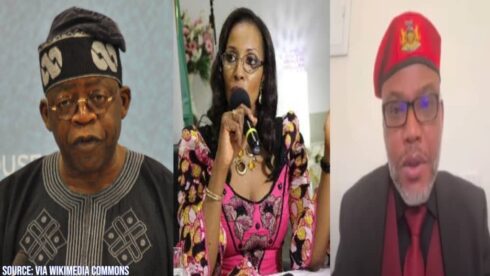Bianca Ojukwu, the Minister of State for Foreign Affairs, has announced that President Bola Ahmed Tinubu is making definitive plans to release the detained leader of the Indigenous People of Biafra (IPOB), Nnamdi Kanu. The statement was made during a press briefing in Abuja, where the minister emphasized the president’s commitment to fostering peace and reconciliation in the southeastern region of Nigeria. Kanu’s prolonged detention has been a contentious issue, drawing widespread protests and appeals from various stakeholders.
According to Bianca Ojukwu, President Tinubu’s decision aligns with his administration’s overarching goal of national unity. “This government believes in dialogue and inclusion as the pathway to addressing the concerns of all Nigerians,” Minister Bianca Ojukwu said. The move to release Kanu is seen as a strategic step toward de-escalating tensions in the region and promoting stability.
Minister Bianca Ojukwu: Background on Nnamdi Kanu’s Detention
Nnamdi Kanu has been in detention since 2021 after his controversial re-arrest in Kenya and subsequent extradition to Nigeria. The IPOB leader faces multiple charges, including treason and terrorism, stemming from his activities promoting the secession of Biafra from Nigeria. His arrest sparked international attention, with human rights organizations criticizing the Nigerian government for alleged violations of due process.
The situation has remained a polarizing issue, with some seeing Kanu as a freedom fighter championing the rights of the Igbo people, while others perceive him as a threat to Nigeria’s sovereignty. Efforts to secure his release have been ongoing, with traditional rulers, international mediators, and prominent politicians advocating for his freedom.
Minister Bianca Ojukwu: Southeast Leaders Welcome the Announcement
Key political and traditional leaders from the southeastern states have expressed optimism following Bianca Ojukwu’s declaration. The chairman of the South-East Governors’ Forum, Governor Peter Mbah, described the development as “a significant milestone in rebuilding trust between the federal government and the Igbo community.” He highlighted that Kanu’s release could pave the way for meaningful dialogue and long-term peace.
Similarly, Ohanaeze Ndigbo, the apex Igbo socio-cultural organization, applauded President Tinubu’s decision. Speaking through its president, Chief Emmanuel Iwuanyanwu, the group called for the immediate implementation of Kanu’s release to demonstrate the government’s sincerity. “We hope this is not just a promise but a firm commitment to resolving a lingering crisis,” Iwuanyanwu remarked.
Minister Bianca Ojukwu: Potential Implications for IPOB and the Southeast Region
Kanu’s release is expected to have far-reaching implications for the IPOB movement and the overall security situation in the southeast. Experts predict that his freedom could lead to a reduction in separatist activities, including frequent sit-at-home protests that have disrupted economic and social life in the region.
However, concerns remain about how Kanu’s release might influence IPOB’s internal dynamics. Some analysts argue that his freedom could either strengthen IPOB’s position or lead to internal factionalism, depending on how the group perceives his leadership post-release. Policymakers are urging caution and sustained dialogue to manage the transition effectively.
Minister Bianca Ojukwu: Federal Government’s Strategy for Reconciliation
The Tinubu administration has underscored its readiness to adopt non-violent strategies in addressing national grievances. The minister of state revealed that Kanu’s release forms part of a broader initiative to engage with aggrieved groups across the country. “President Tinubu believes in using inclusive governance to heal wounds and restore faith in the Nigerian project,” Bianca Ojukwu noted.
As part of this reconciliation framework, the government is also considering granting amnesty to low-level offenders associated with IPOB and reintegrating them into society. Additionally, dialogue committees comprising political, traditional, and religious leaders are being constituted to bridge the divide between the federal government and the southeast region.
Public Reactions and Next Steps
The news of Kanu’s imminent release has elicited mixed reactions from Nigerians. While many have lauded the president for this bold step, others remain skeptical about its long-term impact. Social media platforms have been abuzz with debates on whether this move could truly unite the country or exacerbate existing divisions.
As the government finalizes plans for Kanu’s release, the focus will shift to ensuring a smooth reintegration process and monitoring the implications on regional and national security. The coming weeks will be critical in determining whether this decision heralds a new era of peace or opens a fresh chapter of challenges for Nigeria.
Table of Contents
Discover more from OGM News NG
Subscribe to get the latest posts sent to your email.














